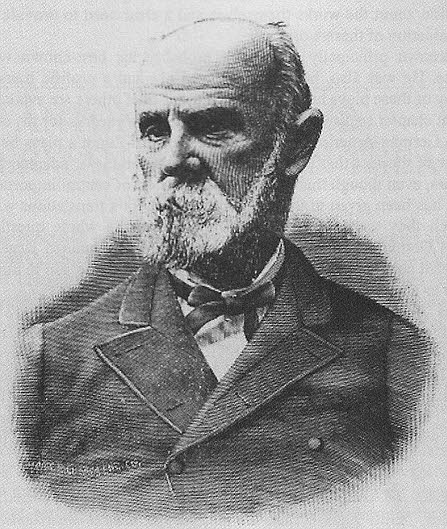German immigrants contributed to Jefferson City in many ways. The contribution of 19th-century German progressives has not received attention because they were not organized and had no name.
Few in number, not more than 50, they were vastly outnumbered by other Germans. I call them "progressives" for being dissatisfied with the status quo and advocating often unpopular changes or "progress." Many supported the Radical Republican Party that took over post Civil War state government.
Who were these early German progressives? Their core comprised immigrant refugees from the failed German revolutions of the first half of the 19th century in which the struggle for freedom from governmental and ecclesiastical autocracy was squashed by royalist armies. They subscribed to the humanism of Goethe and Schiller, which in America translated into elevating women's status and treating Blacks as equals.
German progressives were well-educated, especially in the humanities, and expressed their ideas through oratory, drama and poetry. City-oriented, they encouraged rapid learning of English and rapid integration into public life in contrast to the tradition-preserving German Catholics and Lutherans in their parish churches. Progressives advocated diversity and multiculturalism by bringing visitors to Jefferson City who offered different ideas. In 1892, progressive German Central Evangelical Church hosted Amen Hasi, Palestinian speaker and perhaps the first Moslem in Jefferson City, "to illustrate customs and practices of Mohammedans and oriental ways in general."
Progressives made their mark in the beginnings of public education in Jefferson City. They established their own German- English School at 216-222 W. McCarty before the Civil War. Four of the six members of the first Board of Education (1867) were German immigrants. In her history of Jefferson City public schools, Jerena Giffin wrote "it was the German element who were the main supporters of the earliest public school efforts." That "German element" was more specifically German progressives.
German Catholics and Lutherans maintained their parochial schools. Progressives insisted local taxation for schools include provisions for a Black school, which roiled voters just after the Civil War. Progressives brought from Germany belief that school teaching was a profession and one not left to pedagogically untrained, unmarried women.
Progressives stood out for their religious views, sharpened by what they experienced in Germany as disallowing freedom of personal belief. While unquestioningly Christian, they dismissed the many denominations that Christianity had been divided into. They disdained adherence to a particular interpretation of scripture to the exclusion of others. They were sheltered throughout Missouri in the Protestant Evangelical Church, which became the liberal United Church of Christ in 1957. Jefferson City's Central Evangelical Church, born in 1858 as a "union" church for all, accepted different creeds and confessions and let members use their personal interpretation of scripture to reconcile differences.
Progressives were outspoken in civic affairs well beyond what their small numbers would suggest in elective city offices like mayor, treasurer, assessor and the City Council.
Notable Jefferson City progressives include:
Ernst Anton Zuendt gave up his German inherited title of baron to become a humanist author and journalist in America and doyen of German American poets; was the first German teacher (1868) in local public schools and left an indelible mark in the character of early public education; established the local Turners Club, center of German progressivism.
Fred H. Binder, architect, builder, mayor, councilman and leader in many civic projects; president and builder of Central Evangelical Church; brought from Germany the concept of a building and loan association, a progressive idea that enabled common people to acquire their homes affordably and avoid usurious interest rates of banks.
Theodore Schultz, High Street grocer, city assessor, justice of the peace and Civil War veteran, in whose back room progressives met for gemtlichkeit while discussing social and political issues.
Fred Knaup used his High Street City Hotel to be unofficial greeter of arriving German progressives and others; he was on the board of education for 23 years.
Nicholas DeWyl and family, pharmacists; daughter Frederika DeWyl Simonsen shunned the social status then expected of women to become Missouri's first licensed female pharmacist; they were members of the Evangelical Church.
George Wagner, Bavarian brewer who left the confessional Lutheran Church to join the open Evangelical Church; sons Conrad, Lorenz, and William used their fortunes to help develop the city, like Wagner Place and Monroe House.
Federal Judge Anton Krekel, a leading figure in establishing Lincoln University, relentlessly pushed for Black education.
The Rev. Joseph Rieger, lived with abolitionist Congregationalists in New England before becoming first pastor of Central Evangelical Church in 1860, spoke out for abolition and education of Blacks at Lincoln University and in public schools.
On June 13, 2021, Central Church, its progressive members having earlier left to organize The Oasis United Church of Christ, voted to leave the liberal United Church of Christ denomination.
Walter Schroeder grew up in Jefferson City's historic German Southside, now known as Old Munichburg. A retired professor of geography, he is devoted to preserving cultural history and is the author of three books on the history of the Old Munichburg neighborhood.

